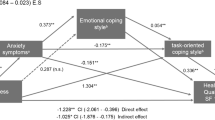Abstract
In an attempt to examine differential effects of personality on health-related quality of life (HRQoL) without regard to disease type, we used the HRQoL-20, a general questionnaire (Japanese original scale) we developed (comprising 20 questions related to physiological, psychological or social HRQoL) and the Eysenck Personality Questionnaire (EPQ), which measures personality traits of extraversion (E), neuroticism (N) and psychoticism (P). The subjects (399 males and 429 females), stomach cancer patients, non-cancer patients (who had received acupuncture or moxibustion treatment) and healthy controls, were classified into three personality types. The results indicated that the HRQoL score of the tolerable/tolerant type (high E, low N and high P scorers) was greater than the intolerable/intolerant type (low E, high N and low P scorers) and also the unclassified type (neither of above scorers). The HRQoL correlated positively with the E and P scales and negatively with the N scale, in the case of all subjects, with the exception of N in male cancer patients and E in male non-cancer patients. The results supported the hypothesis that the HRQoL varies with personality variables, in that each patient, in different treatment settings, strives for the situation that is congruent with his/her personality to attain a better HRQoL.
Similar content being viewed by others
References
Aaronson NK, Bullinger M, Ahmedzai S. A modular approach to quality of life assessment in cancer clinical trials. Recent Res. Cancer Res 1988; III: 231-249.
Yamaoka K, Hayashi F, Hayashi C, Shigehisa T, Watanabe M. Influence of personality on quality of life measurement. Jap J Health Psychol 1996; 9: 11-20 (in Japanese)
Ware JE, Sherbourne CD. The MOS 36-item Short-form Health Survey (SF-36). 1. Conceptual framework and item selection. Med Care 1992; 30: 473-483.
The EuroQol Group. EuroQol — a new facility for the measurement of health-related quality of life. Health Policy 1990; 16: 199-208.
Yamaoka K, Hayashi F, Hayashi C, Misumi J, Takezawa S, Maeda M, et al. A Japanese version of the questionnaire for quality of life measurement. Ann Cancer Res Ther 1994; 3: 45-53.
Yamaoka K, Ogoshi K, Haruyama K, Kobayashi K, Takeda Y, Watanabe M, et al. Validity of the Japanese version of the questionnaire for quality of life measurement (QOL20). IMD, in press.
Yamaoka K. Questionnaire construction of quality of life and quantification method III. In: Hayashi C (ed.) The Eighth Japan and Korea Joint Conference of Statistics, Okayama, Japan, 1994. pp. 77-82.
Eysenck HJ, Eysenck SBG. Manual of Eysenck Personality Questionnaire (Junior and Adult). San Diego, CA: EdITS, 1975.
Eysenck HJ, Eysenck SBG. Manual of Eysenck Personality Inventory. San Diego, CA: EdITS, 1968.
Guttman L. The quantification of a class of attributes. A theory and method of scale construction. In: Horst P, ed. The Prediction of Personal Adjustment. New York: Social Science Research Council, 1941. pp. 319-348.
Hayashi C. Theory and example of quantification (II). Proc Inst Stat Math 1956; 4: 19-30.
Hayashi C. Quantification method III or correspondence analysis in medical science. Ann Cancer Res Ther 1992; 1: 17-21.
Eysenck HJ, Eysenck SBG. Manual of the Eysenck Personality Scales (EPS Adult). Sevenoaks, Kent: Hodder & Stoughton, 1991.
Eysenck HJ, Eysenck SBG. Manual of Eysenck Personality Questionnaire-Revised. San Diego, CA: EdITS, 1993.
Lynn R, Martin T. National differences for thirty-seven nations in extroversion, neuroticism, psychoticism and economic, demographic and other correlates. Person Individ Diff 1995; 19: 403-406.
Barrett P, Eysenck SBG. The assessment of personality factors across 25 countries. Person Individ Diff 1984; 5: 615-632.
Shigehisa T. Personality and cancer: a cross-cultural perspective. Ann Cancer Res Ther 1995; 4: 5-19.
Shigehisa T, Ikeda S, Koike S. Rationality-antiemotionality, harmony-seeking and related variables: an analysis of premorbid personality. Tokyo Kasei Gakuin Univ J 1995; 35: 421-436.
Shigehisa T, Fukui, I. Cancer-prone type C personality toxic component: suppression of emotion. Jap Health Psychol 1995; 3: 25-39.
Shigehisa T, Oda M. Premorbid personality, anger and behavioral health: the multifactorial approach to health and disease. Jap Health Psychol 1993; 2: 43-53.
Bowling A. Measuring Health: a Review of Quality of Life Measurement Scales. Backingham: Open University Press, 1991.
Calman KC. Definitions and dimensions of quality of life. In: Aaronson NK, Beckman J (eds) The Quality of Life of Cancer Patients. New York: Raven Press, 1987. pp. 1-9.
Cox DR, Fletcher AE, Gore SM, Spiegelhalter DJ, James DR. Quality-of-life assessment: can we keep it simple? J R Stat Soc A 1992; 155(Part 3): 353-393.
Kentros MK, Terkelsen K, Hull J, Smith TE, Goodman M. The relationship between personality and quality of life in persons with schizoaffective disorder and schizophrenia. Qual Life Res 1997; 6: 118-122.
Costa PT Jr, McCrae RR. Influence of extroversion and neuroticism on subjective well-being. J Person Soc Psychol 1980; 38: 668-678.
Costa PT Jr, McCrae RR, Zonderman AB. Environment and dispositional influences on well-being: longitudinal follow-up of an American national sample. Br J Psychol 1987; 78: 299-306.
Headey B, Wearing A. Personality, life events and subjective well-being: toward a dynamic equilibrium model. J Person Soc Psychol 1989; 47: 731-739.
O'Leary A, Shoor S, Lorig K, Holman HR. A cognitive — behavioral treatment for rheumatoid arthritis. Health Psychol 1988; 7: 527-542.
Schroder KEE, Schwarzer R, Endler NS. Predicting cardiac patients' quality of life from the characteristics of their spouses. J Health Psychol 1997; 2: 231-244.
Schwarzer R. Optimism, vulnerability and self-beliefs as health-related cognition: a systematic overview. Psychol Health 1994; 9: 161-180.
Friedman LC, Nelson DV, Baer PE, Lane M, Smith FE, Dworkin RJ. The relationship of dispositional optimism, daily life stress and domestic environment to coping methods used by cancer patients. J Behav Med 1992; 15: 127-141.
Bandura A. Self-efficacy mechanism in psychobiologic functioning. In: Schwarzer R, ed. Self-efficacy: Thought Control of Action. Washington, DC: Hemisphere, 1992: 355-394.
Author information
Authors and Affiliations
Rights and permissions
About this article
Cite this article
Yamaoka*, K., Shigehisa, T., Ogoshi, K. et al. Health-related quality of life varies with personality types: a comparison among cancer patients, non-cancer patients and healthy individuals in a Japanese population. Qual Life Res 7, 535–544 (1998). https://doi.org/10.1023/A:1008830509237
Issue Date:
DOI: https://doi.org/10.1023/A:1008830509237




